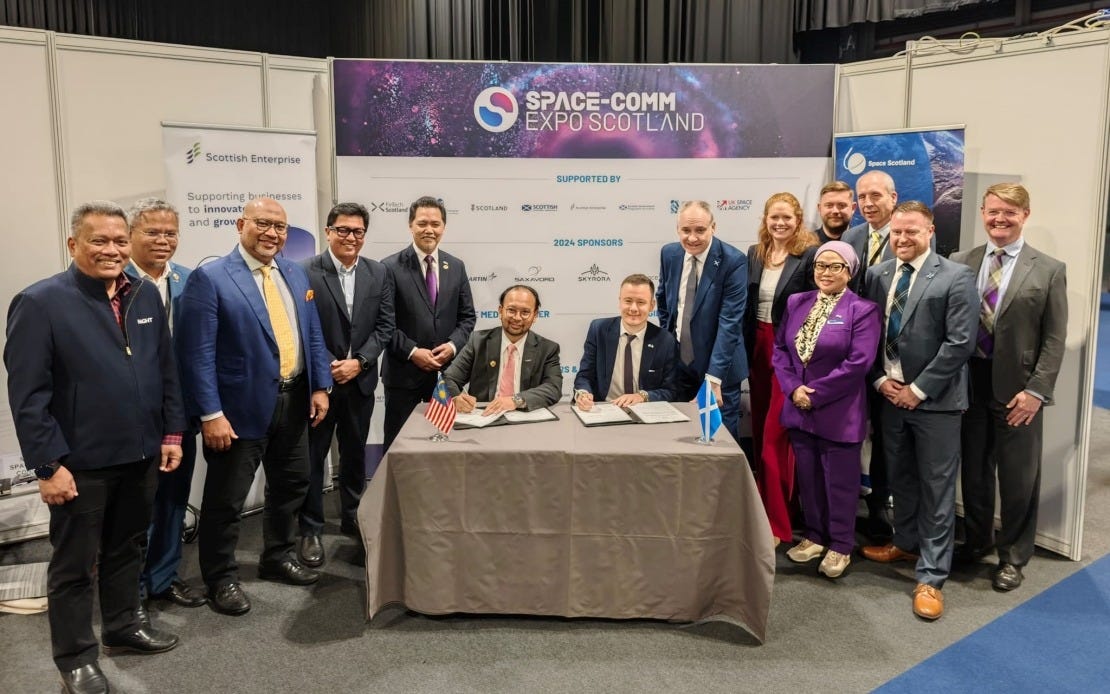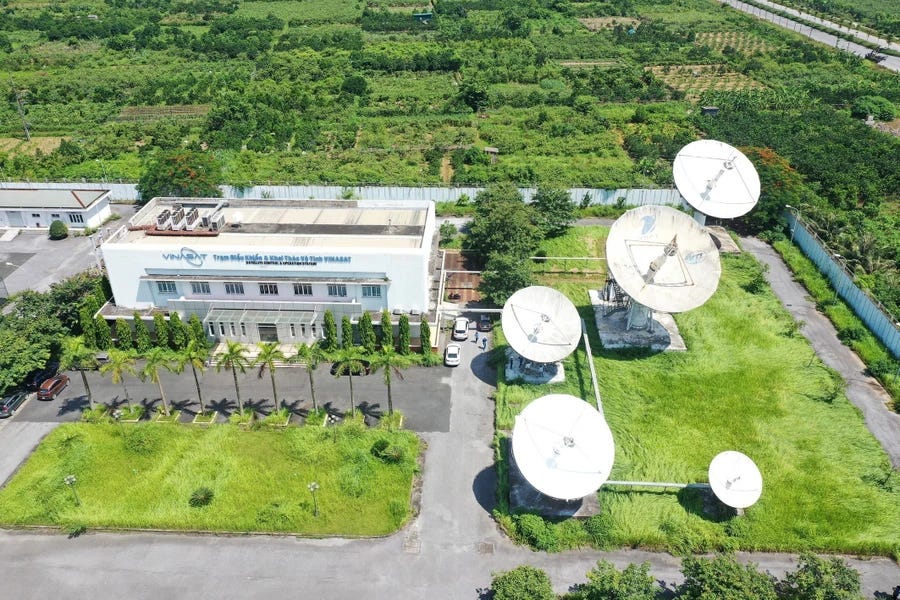Southeast Asia Space Roundup: 12 to 18 September 2024
A summary of all the space news in Southeast Asia over the past week, brought to you by AzurX
The following are the major space developments in the Southeast Asian region tracked by Southeast Asia Space Monitor over the past week:
Malaysia Space Developments
Malaysia’s Uzma Partners with Finland’s ReOrbit to Build Small GEO Communications Satellite
ReOrbit, a leading provider of software-enabled satellites based in Finland, has formed a strategic partnership with Uzma Berhad, a prominent energy and technology solutions provider in Malaysia, to develop a geostationary Earth orbit (GEO) communications satellite. This collaboration aims to enhance connectivity and ensure reliable coverage across Malaysia, leveraging the strengths of both organisations. Dato' Kamarul Redzuan, CEO of Uzma, highlighted the transformative potential of new space technologies in reshaping connectivity and fostering a sustainable future in the New Space Economy. Sethu Saveda Suvanam, CEO and Founder of ReOrbit, emphasised the significance of this agreement in unlocking Malaysia's connectivity potential and supporting its burgeoning economy. ReOrbit's expertise lies in building flexible and secure satellites that incorporate onboard edge processing and interoperability, while Uzma Berhad is expanding its technological capabilities into the space sector. This partnership reflects both companies' commitment to innovation and excellence in advancing Malaysia's space initiatives.
Malaysia’s MOSTI Driving Greater Private and State Interest in Space Sector
The Ministry of Science, Technology, and Innovation (MOSTI) of Malaysia is actively encouraging greater involvement from both the private sector and state governments in the aerospace industry, with a particular focus on advancing the space sector in 2024. Secretary-General Datuk Dr. Aminuddin Hassim highlighted the ministry's commitment to developing space technology, noting interest from various states in establishing space launch sites and forming international partnerships. Sarawak's announcement of a new space training centre underscores this momentum, as it aims to enhance local capabilities in the aerospace field. Currently, Malaysia boasts over 70 private companies engaged in aerospace activities, and MOSTI has initiated the Malaysia Space Industry Consortium (MASIC) to further enhance the country's space infrastructure, including the development of academies and launch facilities. This proactive approach reflects Malaysia's ambition to strengthen its position in the global space industry.
Malaysia’s Uzma Group to Collaborate with Celestia UK on SATCOM Capabilities and Infrastructure
Celestia has entered into an Expression of Interest (EOI) with Uzma Group to collaborate on advanced satellite solutions for the Southeast Asian market, following the successful Space Trade Mission to Malaysia organised by Scottish Development International and other key Malaysian entities. This partnership aims to enhance satellite communications and infrastructure, specifically focusing on MicroGEO satellites and innovative technologies such as Celestia's Ka-band, multi-beam phased array SATCOM gateway, which promises improved reliability and bandwidth capabilities. Dr. Malachy Devlin, CEO of Celestia UK, emphasised the significance of this collaboration in supporting Malaysia's ambitions in the space sector, while Uzma's CEO, Dato’ Kamarul Redzuan Mohamed, highlighted Scotland's status as a hub for space innovation. Scottish Development International noted that this partnership marks a crucial step in fostering international collaboration within the space industry, aiming to contribute significantly to the economic growth of both Scotland and Malaysia's space sectors.

Malaysia’s Space Industry Consortium and Space Scotland Sign MoU
The Malaysian Space Industry Consortium (MASIC) has signed a memorandum of understanding (MoU) with Space Scotland to enhance collaboration in the space sector, capitalising on the strengths of both nations' space ecosystems. The MoU, facilitated by the Malaysian Industry-Government Group for High Technology (MIGHT), outlines areas for cooperation including strategic partnerships, technology exchange, workforce development, and sustainable space practices. This agreement reflects the deepening bilateral ties between Scotland and Malaysia in the global space industry, following a successful space trade mission earlier this year. The MoU was signed by MASIC President Datuk Kamarul Redzuan Muhamed and Space Scotland Board Member Daniel Smith, with notable attendance from government officials. Additionally, Kamarul Redzuan signed an Expression of Interest with Celestia UK to explore collaborative projects, further strengthening Malaysia's presence at the event. Gading Berhad also signed an Expression of Interest with Fire Arrow of Scotland, showcasing a growing interest in international partnerships within the space sector.
Sematan in Sarawak Identified as Ideal Location for Space Launch in Malaysia
In Malaysia, Sarawak’s Premier Datuk Patinggi Tan Sri Abang Johari Openg has announced that Sematan in Lundu has been identified as a prime location for satellite launches due to its proximity to the equator, with support from the Malaysian Space Agency (MySa). During a recent event, he emphasised the broader scope of the aerospace industry, which includes sectors like semiconductors, avionics, and satellite components. To prepare for the industry's expansion, new Bachelor of Aerospace degree programmes are being introduced at i-CATS University College and Swinburne University of Technology Sarawak Campus. Abang Johari highlighted the importance of training the local workforce to meet industry demands, thereby creating lucrative job opportunities and improving household incomes. His remarks were made during the launch of the Kembara Kasih KPWKM initiative, which aims to connect local communities with government services.
Indonesia Space News
Indonesia’s Outgoing Communications Minister Touts SATRIA-1 SATCOM
Indonesia’s Minister of Communication and Informatics Budi Arie Setiadi highlighted key achievements in the country's digital transformation during his leadership, particularly the installation of approximately 5,000 base transceiver stations (BTS) that were previously stalled. The inauguration of these stations at the end of 2023, alongside the launch of the Republic of Indonesia-1 Satellite (SATRIA-1), is part of the government's commitment to enhancing equitable connectivity as outlined in the Digital Indonesia Road Map (2021–2024). As he approaches the end of his term, Setiadi emphasised his focus on strengthening the digital ecosystem, including the development of regulations to support advancements in information and communication technology, such as guidelines on artificial intelligence ethics.
Indonesia’s Air Force Chief Highlights Role of Satellites in Humanitarian and Disaster Relief Operations
During the Bali Regional Air and Space Power Forum 2024, Chief of Air Force Staff Marshal Tonny Harjono underscored the vital role of aerospace technology in managing natural disasters, particularly in Indonesia, which is situated in the Pacific Ring of Fire and faces significant disaster risks due to climate change. He highlighted the importance of unmanned aerial vehicles (UAVs) and satellites in enhancing Humanitarian Assistance and Disaster Relief (HADR) operations, citing their effectiveness in rescue missions and disaster impact mitigation. Harjono noted the increasing frequency of natural disasters, with over 26 million people affected in 2023 alone, and emphasised the necessity for international readiness and collaboration to address these challenges effectively. He pointed to successful disaster management during the Mount Semeru eruption and the 2018 earthquake as examples of the benefits of utilising advanced information technology. The forum gathered approximately 200 participants from various countries to share insights and experiences related to aerospace technology and HADR operations, reflecting the growing importance of international cooperation in building resilience against natural disasters.
Other Regional Space Developments

Thailand’s Thaicom Selects Kratos for Software-Defined Satellite Ground System
Kratos Defense & Security Solutions, Inc. has secured a contract with Thailand’s Thaicom to provide an end-to-end ground system that will enhance the operational capabilities of Thaicom's new software-defined satellite, THAICOM-10. This innovative satellite allows for dynamic adjustments in capacity and coverage while in orbit, aligning with the evolving demands of the Asia-Pacific market. Kratos' ground system will support Thaicom in configuring the satellite and ground operations in tandem, optimising service delivery to customers on demand. The implementation of a satellite operation centre (SOC) will enable comprehensive management of satellite resources, including traffic planning and payload orchestration. Thaicom's Senior Vice President emphasised that Kratos’ expertise and previous success with THAICOM-8 provide confidence in maximising the satellite's value. This partnership highlights the growing trend of integrating advanced ground systems with software-defined satellites to enhance service quality and create new business opportunities in the satellite communications sector.
Myanmar Government Cracks Down on Satellite Internet Services in Kachin State
Government troops in Myanmar have intensified their crackdown on internet access by raiding shops and hotels that provide satellite-based services, such as IPStar and Starlink, in Myitkyina, the capital of Kachin State. This follows a nearly complete shutdown of phone and internet services across Kachin's four districts and 18 townships since 21 July 2024, aimed at preventing communication in light of potential attacks by resistance groups. As residents sought alternative internet access for essential activities like money transfers, businesses began offering satellite services for up to $12 per hour. However, recent raids have led to multiple arrests, particularly targeting those facilitating financial transactions via these services. Local business owners expressed growing concerns about operating under the junta's restrictions, especially after warnings against the installation of satellite internet due to the ongoing blackout. While some phone services have been partially restored in Myitkyina, the internet blackout remains, highlighting the government's control over communications and its impact on civilian life in the region. Civil society organisations have reported extensive internet disruptions across Myanmar, with Kachin State experiencing significant impacts.
Official: Singapore Seeks to Expand Space Sector, Become SE Asia Regional Hub
Australian online publication Space & Defense interviews Jonathan Hung, Executive Director of Singapore's Office for Space Technology & Industry (OSTIn), an organisation that plays a pivotal role in advancing the country's space sector. OSTIn is tasked with nurturing space technology capabilities aligned with national priorities, fostering a competitive space industry, and creating a supportive regulatory framework for space activities in Singapore. Additionally, the office aims to expand international partnerships and contribute to the global governance of space while developing talent for the city-state's future workforce. The interview can be watched in its entirety here:
Be sure to catch up with space activities in the region in the next edition of Southeast Asia Space Monitor’s space roundup!




